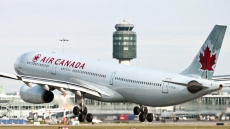TORONTO - The unrelenting climb in COVID-19 cases in Canada continued Thursday amid tightening restrictions aimed at curbing the pandemic as experts warned against prescribing or using unproven cures for the disease which has killed 37 people and infected close to 4,000 others.
Despite the surge, Canada's chief public health officer, Theresa Tam, said the health system has been coping but warned of the dangers facing seniors in nursing homes.
"The fact that Canada's fatality rate is at one per cent indicates that the health care system is not currently overwhelmed," Tam said. "These fatalities could be reduced further by preventing the illness in our most vulnerable population."
New infections and deaths were reported across the country. A 91-year-old man in a seniors home became the eighth person in Quebec to succumb to COVID-19, authorities said. Premier Francois Legault reported 1,629 confirmed cases, up by 290, in the province.
Ontario reported 170 new cases, another daily record jump, bringing its total to 858. Thirteen people have died and at least 12 of the new patients — including two in their 20s — were in hospital.
The pandemic, which is taxing the health-care system, has idled large swaths of the work force in a matter of days. Claims for employment insurance benefits have skyrocketed.
To ease the financial devastation, governments across the country have opened the money taps. They've also urged creditors to go easy on those suddenly unable to make rent or other payments.
Prime Minister Justin Trudeau said the federal government was asking banks and credit card companies to lower interest rates for financially struggling Canadians. The government was also looking at extending lower-interest credit directly to consumers, Trudeau said on Thursday.
The grim situation is being seen around the globe, with about half-a-million people identified as infected and more than 22,000 deaths reported.
Parliament on Wednesday approved the flow of $52 billion in direct financial aid to Canadians and another $55 billion in tax deferrals. Despite the extraordinary all-party effort to pass the legislation, it could be weeks before needy recipients start getting cash in their hands.
COVID-19 is highly contagious and can strike anyone, although it is older people and those with less optimum health who are most at risk of succumbing to the flu-like illness, experts say. People can also infect others without showing any signs themselves.
Frantic efforts to develop a vaccination or cure are ongoing around the world and experts are warning about the risks of unproven treatments. British Columbia's College of Pharmacists urged health professionals to resist demands for access to anti-viral or anti-malaria drugs not proven safe or effective for treating the virus infection.
If therapies such as the anti-malarial hydroxychloroquine are prescribed outside of a clinical trial, pharmacists have been instructed not to fill the prescription, the college said.
Government and health authorities upped their pleas for people to keep their distance from others and to wash hands frequently to dampen the coronavirus spread, with fines or jail threatened for those violating rules to self-isolate or avoid larger gatherings.
Activists pressed their concerns about the difficulties facing the homeless. The closure of coffee shops and drop-in centres has only made it harder for those without homes to wash their hands and keep their distances from others.
Grocery Gateway, which delivers supermarket goods ordered online in and around Toronto, said one of its drivers has tested positive for COVID-19. The company, which bills itself as Canada’s largest online grocery delivery service, said it had alerted customers who had contact with the driver over the past 14 days.
For those returning to Canada, a mandatory 14-day quarantine is now in effect. Scofflaws face a maximum $750,000 in fines or six months in jail. Tam said random checks including home visits, would be done to ensure people abide by the quarantine law.
Trudeau said he was talking to the United States about ensuring the Canada-U.S. border remains free of military presence. The U.S. was reported as considering troop deployment to its northern border to thwart irregular border crossers, something the Trudeau government said was essentially a domestic American decision.

